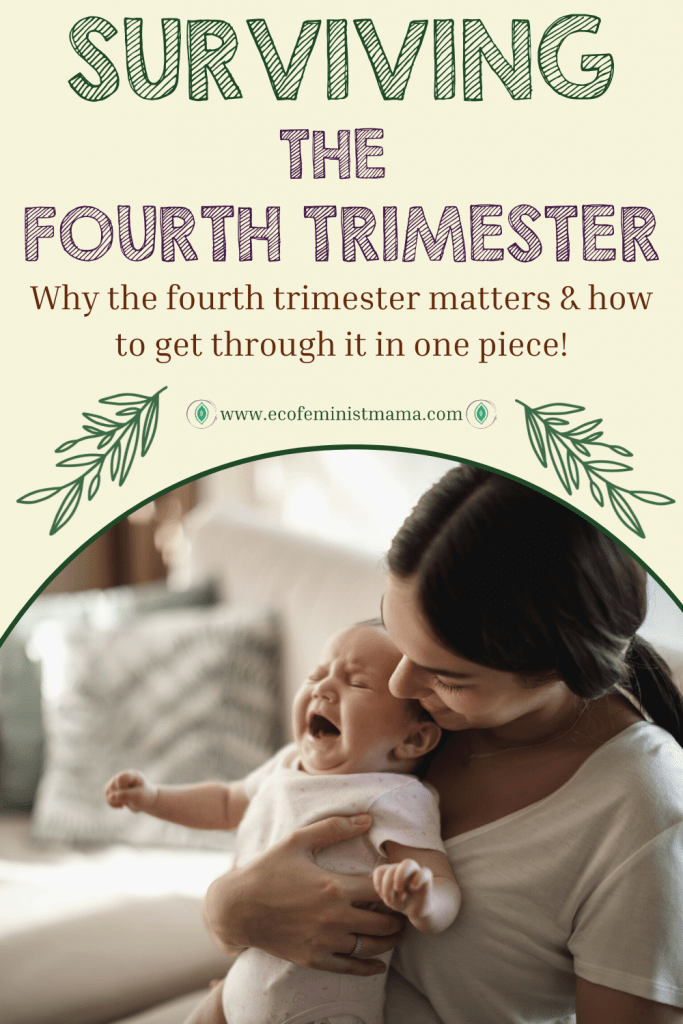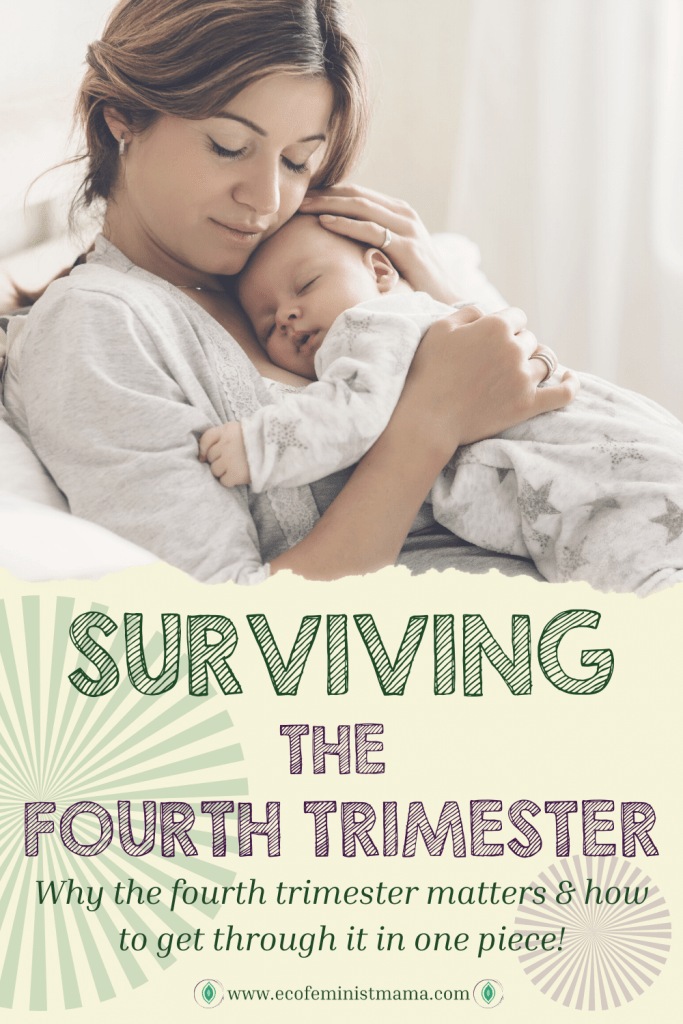As I write this I’m 39 weeks pregnant with my second baby and I’m doing all the last bits of preparation. Home birth kit: Check. Just-in-case eco-friendly hospital bag: Check. Cloth nappies sanitised and baby clothes washed: Check. But there’s one aspect of pregnancy and birth that was wildly underprepared for the first time that I’m now thinking about a lot. That is, surviving the fourth trimester.
With my first baby, I’d heard of the fourth trimester but didn’t really think about how it would impact me. This time, I know how tough it can be so I thought I’d write a post on how you can prepare yourself for surviving the fourth trimester. It’s a tough time whether you’re a first-time mum or are experiencing it for the second, third, fourth or even fifth time. Let’s look at what challenges the fourth trimester brings up.
BABY! This is a reusable block, so whatever edits you make in it will apply everywhere it is used. If you want to remove this disclaimer from a post then be careful to delete the parent block (type ‘Reusable Block’ – icon is lego brick), and not to delete the group, image and/or the paragraph blocks (cos then they’ll be deleted from every instance of the reusable block).
Disclaimer: This post contains ethical affiliate links that I genuinely recommend. I may receive a small percentage of any purchases you make as a result of clicking those links. This comes at no extra cost to you and helps me to run this site. Read my full disclosure
What is the fourth trimester theory?
The fourth trimester refers to the first 12 weeks of a baby’s life. The theory of the fourth trimester was first explained by American paediatrician Dr. Harvey Karp. His theory is that human babies are born “too soon” as their brains and bodies are still underdeveloped after 37-42 weeks of pregnancy. Karp says, “think of [baby] as a foetus outside the womb”. For the first 3 months, babies therefore need the same kind of nurturing outside the womb that they had inside it.
This means trying to recreate the environment of the womb as much as possible while the baby transitions to life in the outside world. Think about what it was like in there for your baby. Dark, warm, with familiar noises and lots of movement. In the womb, babies were also in constant contact with their mothers and didn’t have much space towards the end of the pregnancy. This explains why newborn babies get upset by bright lights, unfamiliar sounds and being put down to sleep in a large, open cot.
During the fourth trimester, babies expect and need to have:
- Constant contact with their birth mother. Being near to her is usually acceptable, but the birth mother’s body is their home. All they really want is to be held by her constantly. If you’re adopting a newborn or using a surrogate, this is something you need to pay special attention to. Figure out a strategy to help them overcome the trauma of being separated from her.
- Familiar sounds. It’s very noisy in the womb what with the constant “whooshing” sound of blood flow and a loud heartbeat. As a result, newborn babies are often soothed by white noise, “sshh”ing sounds and heartbeat soundtracks.
- Lots of motion. Mothers have been rocking and swaying their babies for centuries for a reason! They got used to being jiggled around from conception onwards.
- Opportunities to suck. Sucking is a natural comfort to newborn babies. They’re biologically wired to want to suck as much as possible in the first weeks of life. This applies even if you can’t or don’t want to breastfeed.
- Being held on their sides or stomachs. In the womb, baby was rarely, if ever, lying flat on their back. They were in all sorts of acrobatic positions. Babies are therefore often soothed by being held on their side or stomach.
Why is the fourth trimester important?
The fourth trimester is important for two main reasons. Firstly, in consciously nurturing your baby in a way that helps them transition into the outside world, you’re supporting their brain development and attachment to you as their birth mother. Secondly, by understanding how hard this transition is for a baby, you will have a much less stressful time in the early weeks of mothering them.
During the first three months of life, a baby’s neural pathways are developing and connecting at an amazing rate. When you nurture your baby responsively, making sure to hold them when they cry and support their transition into the world, you help their brain development. They attach to you securely as their mother and this attachment sets them up for life. Children and adults who experience this secure attachment are more emotionally stable, have higher self-esteem and are less likely to display developmental delays.
Meanwhile, it’s important that you understand the fourth trimester so that it’s easier to cope with it yourself. New mothers are often baffled and frustrated at the fact that their newborn babies won’t sleep without being held. Go to any motherhood group on Facebook and you’ll see several posts from exhausted mums desperately asking why their baby will only sleep when held, or only sleep in a carrier.
When you understand the fourth trimester it makes sense that your newborn baby wakes as soon as they’re put down. All they’ve ever known is the warmth and safety of their birth mother’s body. It will take a while before they get used to being separated from it and in the meantime, you’ll need to hold them a LOT!
Why is the fourth trimester so hard?
The reason the fourth trimester is so hard is because this time is physically gruelling, emotionally exhausting and psychologically draining. As their mother you’ll be recovering physically from birth while also dealing with hormonal fluctuation. Meanwhile, baby is waking multiple times through the night, feeding constantly, and crying a lot. Add to that the experience of matrescence as you transition into motherhood and it’s a very challenging time.
Throughout the fourth trimester you can expect to experience:
- Difficulty settling your baby
- Multiple night wakes
- Near-constant feeding, especially if you’re trying to establish breastfeeding
- Lots of fussing from your baby
- Emotional ups and downs as your hormones adjust from pregnancy
- Complete chaos as your old routines are turned upside down
- Unpredictability from your baby’s sleep patterns
- Physical discomfort as you recover from birth
- Struggles with identity and sense of self as you experience matrescence (check out my article on matrescence for more on navigating this)
- Feeling torn between wanting to be with your baby all the time and wanting space away from the constant holding and feeding
Hopefully just having an idea of what to expect and knowing that it’s completely normal will help you in surviving the fourth trimester.
How do I survive the fourth trimester?
The keys to surviving the fourth trimester are understanding it, making a plan in advance and asking for help whenever you can. When you understand why the fourth trimester is important, you can find ways to make it easier on both you and your baby. By making a survival plan in advance, you won’t have to think on the spot when you’re hormonal and sleep-deprived. And by accepting that you need help and asking for what you need, you’ll preserve the energy you need for surviving the fourth trimester as a whole.
Understanding
When they’re in the womb, babies get used to:
- Movement
- Noise
- Darkness
- A confined space
- Constant contact with their mother
- Warmth
- Constant nutrition
- Being naked
- Constant sense of being held
- Soft and warm surroundings
What can you do to recreate this experience as closely as possible? How about lots of skin-to-skin contact with you? Swaddling? A white noise machine and blackout blinds?
One solution that solves nearly all of a baby’s fourth trimester issues is babywearing. Invest in a high-quality baby wrap. Then you’ll be able to meet their needs while still having your hands available for all the things you need to do.
Planning
We all know we’re supposed to create a birth plan. Why not create a fourth trimester plan too?? After all, the fourth trimester lasts a lot longer than giving birth! It will help you so much to anticipate what issues will come up for your and make a plan for how to handle them. This way you don’t have to think about it on the spot and you’ll hopefully have everything you need in place.
Questions to ask yourself when creating a fourth trimester plan include:
- What can I do to help create a nurturing environment for my baby?
- How can I use movement, light, sound and physical touch to provide the same kind of comfort they felt in the womb?
- What can I do now to make life easier later when it comes to my other responsibilities and chores?
- Who can I go to for support with domestic work?
- How can I make sure I reserve enough energy to make it through the long nights?
- Who are some people I can call for a supportive chat when it gets difficult?
- What are some favourite podcasts, audiobooks or music that I could listen to during night feeds?
- Are there activities or practices that make me feel recharged and energised other than sleep?
- What trusted resources can I use to make sure I’m not slipping into postpartum depression or anxiety?
Write your responses to these questions in a notebook or digital file so that they’re on hand when you need them.
Asking For Help
Many of us have difficulty in asking for help. It can be hard to admit that we could do with a helping hand, especially for mothers. Our society tells us we’re supposed to be “super mums”, handling it all with grace and style.
Meanwhile, lots of us including myself live miles away from extended family. It used to be that our mothers, aunts, cousins and grandmothers all lived in the same neighbourhood and could easily pop over to help a new mum and baby. Now our families are scattered all over the place and the closed, nuclear family set-up is the norm. Unfortunately this arrangement isn’t practical for life with a newborn. We evolved to raised small children in tribes, not just in twos.
Whether you’re lucky enough to have family nearby or not, what areas do you need help with? Where can you get that help?
Can you ask a family member to bring a meal over one evening so you or your partner are free from cooking duty? If you don’t have anyone to ask, can you afford a service like Cook who make nutritious home-cooked meals? They have a new parents scheme that gives you 10% off all orders for one year. (Not an affiliate link, by the way – I just found out about it and it’s part of my own fourth trimester survival plan!)
If you can’t afford things like that, why not put some gift vouchers for domestic support on your baby wish list?
Does it get better after the fourth trimester?
If you want to know if it gets better after the fourth trimester then, yes, it absolutely does. The first 12 weeks of a baby’s life are undoubtedly the hardest for parents. That said, you’ll still be faced with challenges in parenting, especially in the first year.
Life does get easier after the fourth trimester but that doesn’t mean that looking after children will ever be easy! The challenges change rather than go away all together. You’ll still have to deal with sleep regressions, toddler meltdowns and sassy tween backchat. But hey, that’s why we got knocked up in the first place, right?! To experience all the joys of motherhood…!
Seriously though, the tough bits are really tough, but the joyful moments make your heart burst with more love than you can ever imagine.
I hope you’ve found my post on surviving the fourth trimester helpful. Wishing you all the best on your mothering journey.






